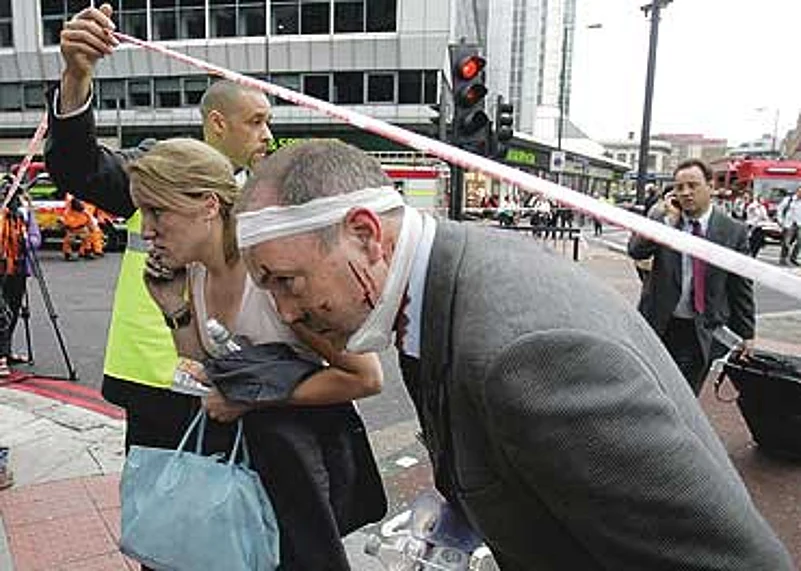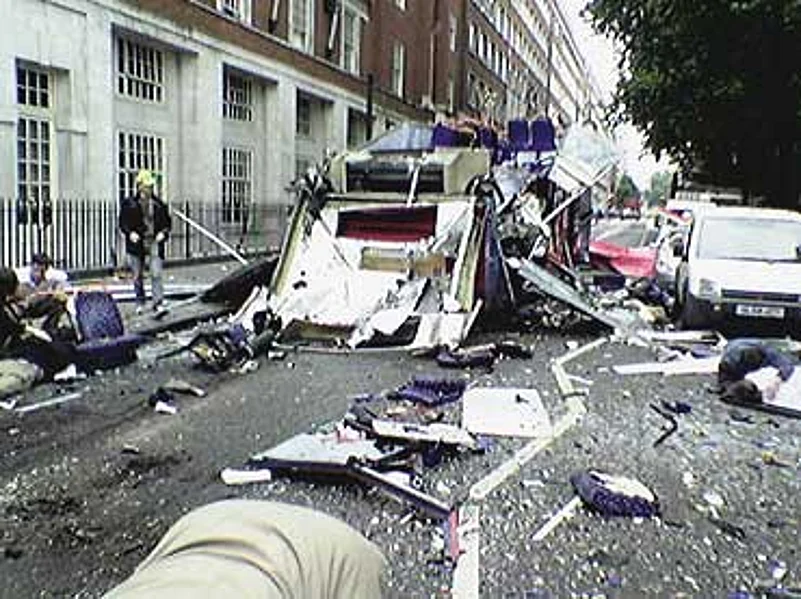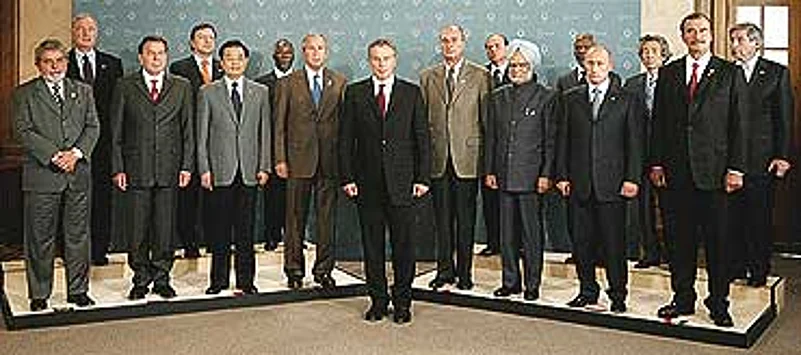
The serial explosions rocked London as its citizens were on their way to offices. The first blast took place at 8.51 am, on an underground Circle line train that was 100 yards into a tunnel outside Moorgate station in east London. Five minutes later, at 8.56 am, the second blast hit a tube train between the King's Cross and Russell Square stations; the third explosion was timed at 9.17 am and involved two or three trains; the fourth ripped apart a double-decker bus at Tavistock Square at 9.47 am. At the time of writing this report, the death toll had touched 40 and was expected to mount.
The similarity with the attacks in Madrid, Spain, on March 11, 2004, were all too obvious. There, too, trains were bombed in the morning rush hour. And there again, a group said to be linked to Al Qaeda was the prime suspect after an initial suggestion that it may have been Basque separatists. Jose Maria Aznar, then Spain's premier who had backed the US invasion of Iraq, had lost the election just two days later.
The Islamist group that claimed responsibility for the London attack was the Secret Organisation Group of Al Qaeda of Jihad Organisation in Europe. On its website the group said, "Nation of Islam and Arab nation: rejoice for it is time to take revenge against the British Zionist Crusader government in retaliation for the massacres Britain is committing in Iraq and Afghanistan. The heroic mujahideen have carried out a blessed raid in London. Britain is now burning with fear, terror and panic in its northern, southern, eastern, and western quarters."

British Prime Minister Tony Blair, who cut short his presence at the G8 summit to fly back to London, took this head on. "We know these people act in the name of Islam," he said in a national address. "But we know the vast majority of Muslims in this country and elsewhere are every bit as law-abiding as the rest of us." When terrorists, he said, "seek to change our way of life by these methods, we will not be changed, our values will outlast theirs". Blair was clearly trying to calm down any possibilities of a backlash against Muslims in Britain over what he called the "barbaric" attacks. British Muslims suffered several attacks in the wake of the 9/11 in 2001. An attack in London now could make Muslims particularly vulnerable—after the blast casualties, no one would be hurt more than British Muslims.
The blasts came the morning after London won the 2012 Olympics. A particular strength of the British case was the diversity Britain represented in its medal tally at the Athens Olympics last year. Black runner Kelly Holmes won two golds, the 17-year-old boxer Amir Khan became a national hero with hissilver. London won acknowledgement and respect, and the Games, in good measure for its credentials as a multiracialcity. British leaders see the blasts now as an attack on that principle of wide inclusion.
Blair abandoned a scheduled meeting with Prime Minister Manmohan Singh to fly back to London. Which meant their presumed differences on tackling climate change did not get aired. But across the distance between Gleneagles and London, a silent commonality to fight terrorism grew stronger. It gave Manmohan an instant cue to tell G8 leaders, just as they were gathering, that terrorism was a global scourge, that India had faced a major attack just two days earlier in Ayodhya, that India knows terrorism does not respect international boundaries. "In India also we have been tackling terrorism and upholding the principle that we are a country of unity in diversity," an Indian official said. "We are fighting the same battle." London has a population among others of about half a million Indians. In the echoes of the blast, the Indian and British governments were finding similar experiences, common ideologies and identical policies.

The G8 leaders (from the US, Britain, Canada, Germany, France, Italy, Japan and Russia) and the leaders from India, Brazil, China, Mexico and South Africa found themselves standing in agreement on what matters most, without a word of discussion, without a shadow of dissent. The new unity, rather than the expected differences, were evident from a statement Blair read out from all the leaders. The attack on London, Blair said, was "not an attack on one nation, but on civilised people everywhere". The leaders were agreed on fighting "fanaticism and extremism" around the world. "Terrorism will not succeed. Today's bombings will not weaken in any way our resolve to uphold the deepest held values of our society. We will prevail, the terrorists will not." Bush later added he was "most impressed" by the resolve of all leaders to work together to fight terrorism.
This was always turning out to be a G8 summit like no other. Disagreements between Britain and several of the other countries, principally the US, over both climate change and action on Africa emerged as so divergent that no draft communique could be agreed upon until the morning of the blasts. For the first time in a long while it had seemed that Britain was headed for a public showdown with the US. The blasts ended all that.

"These attacks have distracted from the core of the G8 at a crucial moment," John Samuel, international director of ActionAid, told Outlook. "Six months of efforts in 70 countries have been undermined by this terrible act. It is not only an attack on humanity, but an affront to the whole issue of poverty and citizens' movements." Blair and Bush, who were heading for a confrontation, had been "let off the hook," he said.
"This G8 had been developing a real head of steam on issues that rarely get the attention they deserve," Tony Juniper from Friends of the Earth International told Outlook. "These inhuman attacks in London have changed the focus." Bush and Blair had been "spinning their different views furiously", but these attacks will "overshadow everything". The difference was primarily over the Kyoto Protocol. Bush had pulled out from Kyoto, and Blair, a signatory, had been saying he would persuade Bush to subscribe to it.
But while the blasts changed the climate at the G8 summit, deep differences arose between developed and developing countries on the issue of climate change. And these could foul the political atmosphere and the earth's atmosphere for many years to come. India and the other developing countries stood firm by the Kyoto Protocol as a necessary way forward.
But Bush seemed to have managed to bring Blair to hisside. The first indication of a change on the Kyoto deal came less than an hour before the blasts. Blair acknowledged there was "no point going back over the Kyoto debate", thereby opening up the possibility of a new protocol with redefinedobligations. Bush said developing nations must be involved in a future deal, and therefore welcomed India and China's attendance at the G8. "Now is the time to get beyond the Kyoto period and develop a strategy forward that is inclusive of the developing nations," he said. But the inclusion could mean the developing world paying for cleaner technologies earlier than envisaged, consequently making economic goods costlier and uncompetitive in the global markets.

For those late on the story, the Kyoto Protocol agreed upon in Japan in 1997 binds industrialised countries listed in Annex-I of the protocol to cut emissions by 5.2 per cent at the end of the first implementation period 2008-2012. The emissions, mostly of carbon dioxide and methane from the burning of fossil fuels in factories and transport such as gas, oil and coal, are believed to cause warming of the air, and consequently disruption of sensitive climate patterns. India was not obliged to take any steps to clean up industry on the basis that the industrial nations are responsible for most of the emissions, and that they primarily must take corrective action. But clearly it will not be easy for India to avoid corrective action of its own beyond 2012.
Though talks got disrupted at Gleneagles, Indian officials stuck to the principle of "common but differentiated responsibility" set out under the Kyoto Protocol. Which means India would still want to opt out of clean but costly new technologies. As reported by foreign secretary Shyam Saran, Manmohan spoke of a "balance between protecting the environment and not perpetuating poverty." On this, Saran said Bush "full-heartedly" accepted India's argument. "No one talked of the need for anything special by India and China," Saran said. Actually Bush had, but apparently not at the meeting with Manmohan. No doubt the two will find an opportunity to disagree at leisure when they meet in Washington on July 18.

























